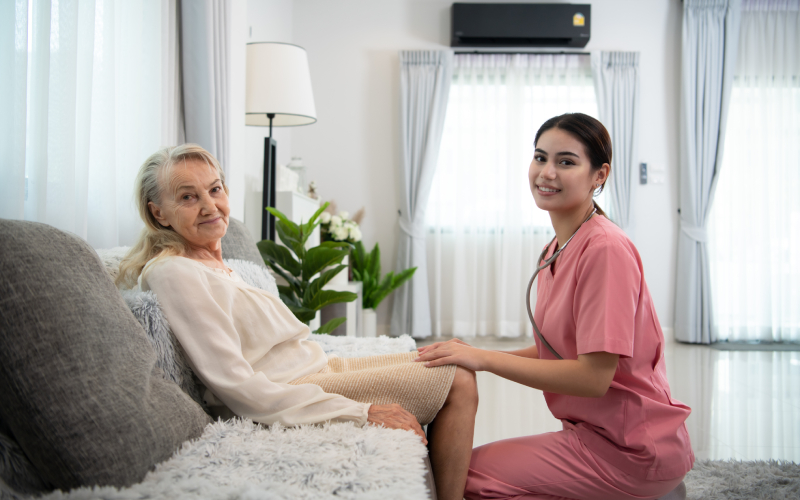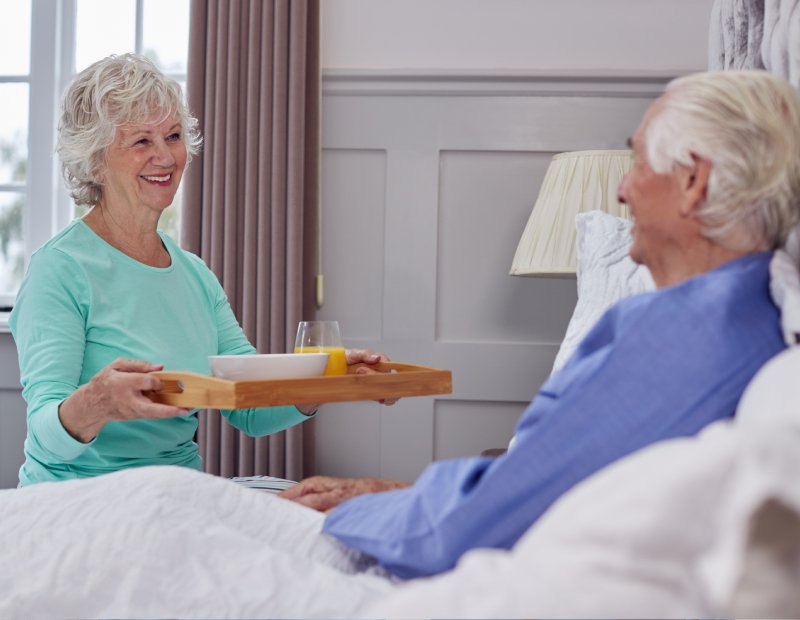Understanding Hospice and Palliative Care
Understanding the distinctions and purposes of hospice and palliative care is essential for making informed decisions about end-of-life care.
Palliative vs. Hospice Care
Palliative care is designed to maintain the highest quality of life while managing treatment and other needs. It encompasses care provided at any stage of a serious illness, focusing on relief from symptoms and the physical, emotional, and psychological stress that accompanies the condition. Patients can receive palliative care alongside curative treatments, aiming to provide a holistic approach to improve overall well-being.
Hospice care specifically caters to individuals who are approaching the end of their lives, typically with a prognosis of six months or less. Hospice services prioritize comfort and quality of life, ensuring patients live their final days with dignity. The comprehensive care involves physical comfort, emotional support, and social and spiritual well-being.
| Feature | Palliative Care | Hospice Care |
|---|---|---|
| Purpose | Maintain quality of life | Comfort in end-of-life |
| Timing | Any stage of illness | Prognosis of 6 months or less |
| Treatment | Can include curative | No curative treatment |
| Focus | Symptom and stress relief | Dignity and quality of life |
Choosing the Right Level of Care
Choosing between palliative and hospice care involves assessing the specific needs of the patient and their stage of illness.
In cases where the patient still seeks curative treatment, or when quality of life is a significant concern due to ongoing treatments, palliative care steps in to provide comprehensive support. For example, managing chronic pain, providing emotional and psychological support, and coordinating complex treatments are crucial aspects of palliative care. For more details on finding the right senior care provider, explore our article on choosing the right senior care provider in Elk Grove.
When the condition progresses to an advanced stage where treatment is no longer effective, and the focus shifts to comfort and dignity, hospice care becomes paramount. Hospice care enables patients to control their life to the extent possible and live their remaining days with ease. It provides a network of support including medical professionals, social workers, and spiritual advisors, ensuring the patient and family feel supported.
Individuals in need of non-medical in-home care to veterans can greatly benefit from understanding the role of hospice in enhancing end-of-life comfort. By choosing the appropriate level of care, we ensure our loved ones receive the comprehensive and compassionate support they deserve. For additional resources, including a comprehensive guide to non-medical home care in Sacramento, visit our website.
Finding Local Hospice Services
Finding the right hospice services for a loved one involves understanding the available resources and knowing where to look. This section will guide you through utilizing CaringInfo resources and locating hospice providers.
Utilizing CaringInfo Resources
CaringInfo, a program of the National Hospice and Palliative Care Organization (NHPCO), provides valuable resources to help families navigate hospice and palliative care options. Their website offers a wealth of information on the differences between palliative care and hospice care. Additionally, they provide tools to assist in making informed decisions about the most suitable care options for the patient’s needs.
A key tool provided by CaringInfo is the “Find a Provider” search tool, available on the NHPCO website. This tool allows users to search for local hospice providers based on specific criteria, ensuring that families can find the right match for their loved one’s needs. For a more detailed guide on utilizing resources for senior care, visit our comprehensive guide to non-medical home care in Sacramento.
Locating Hospice Providers
In addition to utilizing CaringInfo resources, there are several other ways to locate hospice providers in your area. Contacting local community hositals, clinics, and health departments can provide valuable information and recommendations. They are often well-informed about local hospices and can help you connect with reputable providers.
When selecting a hospice provider, it’s essential to consider the services they offer and how well they align with the needs of the patient. Some providers may offer specialized care such as spiritual support, bereavement counseling, and comprehensive emotional support. These services can significantly impact the quality of the end-of-life experience for both the patient and their family. Learn more about the services offered in hospice care from our resource on how Bravo Personal Care Services ensures quality care for seniors.
For veterans and their families, understanding the specific benefits available through the Veterans Aid & Attendance program can be crucial. This program offers additional support to eligible veterans receiving hospice care. To navigate these benefits, please refer to our article on how to access veterans home care benefits in Sacramento.
The table below lists some of the key features to consider when choosing a hospice provider:
| Feature | Description |
|---|---|
| Comprehensive Care | Includes medical, emotional, spiritual, and bereavement support. |
| Accreditation | Providers should be accredited by reputable organizations. |
| Care Team | Ensure the provider has a multidisciplinary team, including nurses, social workers, chaplains, and volunteers. |
| Personalized Care Plans | The provider should offer individualized care plans tailored to the patient’s needs. |
| In-Home Services | Availability of hospice care in the patient’s home for added comfort and convenience. |
Locating the right hospice provider can be a challenging task, but utilizing trusted resources and considering the patient’s unique needs will help ensure the best possible care. For additional support and guidance, consider reading our signs your loved one might need professional home care.
By leveraging resources like CaringInfo and consulting with local health professionals, families can find the right hospice care services to enhance end-of-life comfort and support.
The Benefits of Hospice Care
Hospice care offers profound benefits focused on enhancing end-of-life comfort. By providing comprehensive support, hospice care ensures a dignified experience for individuals approaching the end of life and their families.
Physical Comfort and Emotional Support
Hospice care prioritizes physical comfort and emotional support for patients. A typical hospice care team consists of a nurse, hospice aide, social worker, chaplain, and other specialists who work together to address various aspects of a patient’s well-being (Crossroads Hospice).
| Team Member | Role |
|---|---|
| Nurse | Manages medical needs, medication, and pain relief |
| Hospice Aide | Assists with daily living activities and personal care |
| Social Worker | Provides emotional support and counseling |
| Chaplain | Offers spiritual care and guidance |
| Other Specialists | Provide additional support like music and massage therapy |
This multidisciplinary approach facilitates holistic care, focusing not only on physical symptoms but also on emotional, social, and spiritual needs (Cleveland Clinic).
Services Offered in Hospice Care
Hospice services are designed to cater to the individual needs of patients and their families. Some unique offerings include:
- 24/7 Access to Care: Ensures that patients can receive assistance at any time (VITAS Healthcare).
- Veteran Recognition Ceremonies: Honors the service of veterans, providing them with a sense of dignity and recognition.
- Gift of a Day Program: Allows patients to experience a special day tailored to their wishes.
- Life Journals: Help patients document their life stories, leaving a legacy for their loved ones (Crossroads Hospice).
Additionally, hospice care includes resources like grief support, art therapy, and music therapy to enhance physical comfort and emotional well-being.
By offering these services, hospice care ensures that patients receive comprehensive support, enriching their final days with comfort and dignity. For more on the impact of end-of-life care, see our section on improving support for family caregivers.
Enhancing End-of-Life Comfort
Impact of End-of-Life Experiences
End-of-life experiences (ELEs) have a profound impact on patients, their families, and healthcare professionals. Reports show a prevalence of ELEs ranging from 50% to 90% among patients, 21% to 49% among relatives, and 28% to 95% among healthcare professionals. These experiences often include visions and dreams of deceased loved ones, which provide emotional comfort, peace, and a sense of connection.
| Group | Prevalence of ELEs (%) |
|---|---|
| Patients | 50 – 90 |
| Relatives | 21 – 49 |
| Healthcare Professionals | 28 – 95 |
ELEs, such as deathbed visions and terminal lucidity, often have a positive influence by improving the psychological state and communication abilities of patients before death. Furthermore, these experiences contribute to spiritual change and personal growth for those involved (PubMed Central).
Importance of Hospice Care Team
The role of the hospice care team in enhancing end-of-life comfort is critical. Our team at Bravo Personal Care in Gold River, CA, is dedicated to providing compassionate care that prioritizes both physical comfort and emotional support for veterans and their families. The hospice care team typically includes:
- Physicians
- Nurses
- Social Workers
- Chaplains
- Therapists
- Trained Volunteers
Each member of the team plays a specialized role in ensuring that the patient’s end-of-life journey is as comfortable and dignified as possible. Regular family meetings are held to discuss care plans and address any concerns, reinforcing the importance of collaborative care strategies (how families in sacramento benefit from non-medical home care).
Empathy and high-quality care are the cornerstones of our approach. By focusing on pain management, emotional counseling, and spiritual support, the hospice care team helps in providing a holistic care experience. For more details, visit how bravo personal care services ensures quality care for seniors.
If you’re interested in learning more about how to support your loved ones during this crucial time, explore our resources on choosing the right senior care provider in elk grove and how to access veterans home care benefits in sacramento.
Improving Support for Family Caregivers
Challenges in Providing Support
Family caregivers play an essential role in the end-of-life care of their loved ones; however, providing support to these caregivers comes with its own set of challenges. One significant barrier is the discomfort faced by healthcare professionals when interacting with family caregivers. This discomfort often stems from limited knowledge and conversational skills, as well as a perceived lack of responsibility for the caregivers’ well-being (NCBI).
Moreover, there is frequently a shortage of resources dedicated to systematically supporting family caregivers within healthcare settings. This lack of support can lead to increased stress and burnout among caregivers, negatively impacting their ability to provide effective care.
| Challenge | Description |
|---|---|
| Healthcare Professional Discomfort | Discomfort in interactions due to limited knowledge and skills |
| Perceived Lack of Responsibility | Professionals feeling they aren’t responsible for caregiver well-being |
| Shortage of Resources | Inadequate resources to implement systematic support |
Effective Interventions and Recommendations
To address these challenges, several interventions can be implemented to enhance support for family caregivers. One effective strategy is setting up peer-to-peer coaching programs. These programs can help decrease discomfort among healthcare professionals by providing them with the necessary skills and knowledge to support caregivers effectively.
Additionally, investing time in facilitating closer collaborations between healthcare professionals can lead to better support for family caregivers. Creating physical and social opportunities within the healthcare setting can foster a supportive environment for caregivers.
| Intervention | Description |
|---|---|
| Peer-to-Peer Coaching | Programs to decrease discomfort and enhance skills of healthcare professionals |
| Closer Collaborations | Facilitating teamwork among healthcare professionals for better caregiver support |
| Physical and Social Opportunities | Creating supportive environments within healthcare settings |
Empathizing with family caregivers can also motivate healthcare professionals to provide better support, as understanding the significance of their role can enhance the quality of care provided. Recognizing the beneficial effects on patients further emphasizes the importance of supporting caregivers.
Family meetings in the context of advanced illness can play a crucial role in reducing caregiver burden and psychological distress (PMC). These meetings allow for emotional adjustments, strengthen the relationship with healthcare providers, and provide time for caregivers to prepare for the end-of-life journey.
By implementing these interventions and recommendations, healthcare settings can significantly improve support for family caregivers, thereby enhancing the overall end-of-life experience for patients. To learn more about enhancing care and support, visit our article on comprehensive guide to non-medical home care in Sacramento.
Explore related articles:
- how light housekeeping helps seniors live independently
- the emotional and physical benefits of companionship for seniors
- how to access veterans home care benefits in Sacramento
Empowering Patient and Family
Importance of Family Meetings
Family meetings play a pivotal role in palliative care, particularly in enhancing the end-of-life experience. These meetings provide an essential platform for engaging patients and their families in discussions about serious illnesses. They clarify values, identify care preferences, and reduce caregiver distress, which is fundamental for patient- and family-centered care.
Family meetings offer several benefits:
- Reducing Caregiver Distress: They help ease the emotional burden on caregivers and provide them with the necessary preparation for their roles.
- Enhancing Communication: These meetings improve communication about care goals, ensuring that everyone’s preferences and values are respected.
- Providing Emotional Support: They offer a space for emotional adjustment, helping families cope with the realities of the illness.
- Strengthening Therapeutic Alliances: Collaborative discussions foster stronger relationships with healthcare providers.
| Benefits of Family Meetings | Description |
|---|---|
| Reducing Caregiver Distress | Alleviates emotional burden and prepares family members. |
| Enhancing Communication | Improves dialogue about goals of care. |
| Providing Emotional Support | Aids in emotional adjustment and coping. |
| Strengthening Therapeutic Alliances | Fosters better cooperation with healthcare providers. |
For more information on how activities of daily living can support independence, visit how activities of daily living (adls) keep seniors independent.
Patient Empowerment Through Care
Empowering patients in their care journey is crucial for enhancing their comfort and quality of life. This empowerment involves ensuring that patients are active participants in decision-making regarding their treatment and care plans.
- Active Participation: Involving patients in decisions about their care boosts their confidence and sense of control.
- Clear Communication: Transparent discussions about the available options and expected outcomes help patients make informed choices.
- Respecting Preferences: Honoring the patient’s wishes and preferences is vital for their emotional well-being.
- Providing Information: Educating patients about their condition and care options empowers them to manage their health more effectively.
Empirical evidence supports the importance of patient empowerment in palliative care:
- Improved Communication: Enhances dialogue between patients, families, and healthcare providers (PMC)
- Reduces Caregiver Distress: Helps prepare caregivers for their roles and tasks.
- Promotes Better Outcomes: Leads to better emotional and bereavement outcomes for caregivers.
To learn more about how non-medical home care can promote senior independence, visit how non-medical home care promotes senior independence.
By prioritizing family meetings and patient empowerment, we can significantly enhance the overall end-of-life experience, ensuring that patients and their families feel supported, informed, and respected throughout the process. For a comprehensive guide to home care services, including those focused on veterans, visit our veterans aid & attendance program page.




